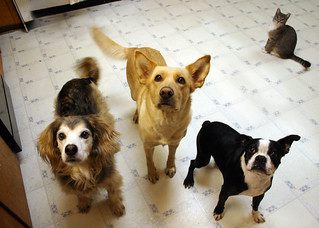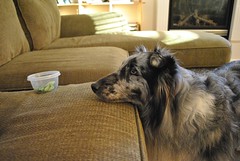Working with picky appetite in dogs with cancer and older dogs – Help, my dog will not eat!
 First off let me say that like with dementia I certainly do not have all the answers to this problem. It can really vary from dog to dog. I’m hoping that the tricks I have learned over the years will help and that you the visitor will also add your own stories.
First off let me say that like with dementia I certainly do not have all the answers to this problem. It can really vary from dog to dog. I’m hoping that the tricks I have learned over the years will help and that you the visitor will also add your own stories.
In people with cancer it is reported that the sense of taste changes. I believe this to also be true in many dogs. While many vets suggest that nausea is at the root of dogs with cancer not eating well, I tend to blame the change in taste more often. In older dogs I believe taste also can get more muted as they age.
There are a two main approaches in working with appetite, one is to make eating more interesting and the other is to use acupuncture, drugs, or herbs that stimulate appetite.
Making eating more exciting for your picky eating dog
- Change things up. Many dogs will do better if there food is changed around on a daily basis.
- Add in table scraps. It is sometimes amazing how much a little human dinner will make a dog dinner more attractive. Meat is usually the most popular. Just remember no macadamia nuts, grapes, raisins, chocolate or onions.
- Salt it – high quality foods are often low in salt. Add in some salt or salted meat broth to make the food more yummy.
- Something stinky – sometimes the addition of the stinky foods will help. Try cat food, sardines, canned salmon, bacon, or if you really want stinky — tripe. They sell tripe for dogs in a can or as a raw food.
- Cooked chickens and roasts. I have had many clients make roasts or buy rotisserie chickens from the store. These are often times yummy but work better if you as the human also eats meat and can share in the feast.
- Try dry food again – I have had dogs that will not eat anything but will suddenly eat dry again. They may turn their nose up at that prime rib and then eat kibble.
- Make eating a game – hide the food behind the furniture, in the closet, outside, drop it by mistake, make it a game. “Look, look what I found, yummy!” Just remember where it is so it doesn’t rot.
- Hand feeding – some dogs do much better if they are hand feed a bit at a time.Ok yes you may be spoiling them but its not like they need to go out and get a job someday. It’s ok to spoil your old or sick dog.
- Heat the food – in the microwave is fine. Sometimes warm food is more yummy.
- It is better to have them eat something than the right thing. If you have a dog with cancer and they will not eat a cancer diet add some carbs/grains back in. It is better than not eating.
- Feed them when they are hungry. Some dogs will only eat in the evening or will only eat small meals. Offer food often and if they are eating well give them a little more when they are hungry.
- Eat with your dog. Some dogs like to eat at the same time as their people.
Increasing appetite in the face of disease
- Look at how many medications/supplements you are giving your dog. I can not stress this enough. I have had dogs come in on 50, yes 50 pills a day, with no appetite. You probably would not be eating on all that either. Before adding something, cut out anything your dog does not need and see if their appetite returns or work with your vet on if some of the important medications can be stopped for awhile. If their appetite returns when you cut back on pills then gradually add things back in. Do not add in more before looking at if you are giving too much! This is especially true of cats which will get their own article on appetite someday.
- Acupuncture can help many dogs with appetite. Consider giving it a try as it has other wonderful benefits for older or sick dogs.
- There are many western drugs out there that can help. If nothing else is working talk to your vet about what is right for your animal friend.
- Herbals – if you have a veterinary herbalist in your area set up a consultation with them. The herbal that I have found works the best in the most animal is a wonderful little formula from Jeremy Ross which he calls Gentiana 2. It contains gentiana and artemisia which are bitters and support appetite along with other herbals (fenugreek, fennel, acorus, ginger, licorice and jujube) that help support digestion. It does not work in all dogs and it’s effect is milder than western drugs but it is gentler on the body and safer. I usually start with it before going to drugs.
Thank you Bill P. for suggesting this topic!
As with all articles on this blog, this does not replace medical advice. If your dog is not eating and you have not seen your veterinarian, please make an appointment to rule out any serious health issue.

